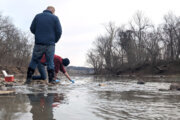June 6, 2019, will mark the 75th anniversary of D-Day. The Allies’ invasion of Normandy, France, is considered to be the turning point in World War II.
It was the largest military operation in human history, with over 160,000 landing on a 50-mile stretch of Nazi-fortified coastline. And even though it would be another 10 months before surrender, it would be the beginning of the end for the Nazis.
A new book by historian Alex Kershaw examines the first bloody, crucial hours of that operation: “The First Wave: The D-Day Warriors Who Led the Way to Victory in World War II.”
Much was riding on this invasion, Kershaw explained to WTOP’s Shawn Anderson and Hillary Howard.
“You would not have a democratic and civilized Western Europe today had we not succeeded,” he said. “Nazism would have prevailed, and the Holocaust would have continued — and millions and millions of enslaved Europeans would not have been liberated.”
The operation carried enormous risks, too. There was no Plan B, and in fact, “we did actually come very close to failure,” Kershaw said.
The logistics of such a big operation were staggering, Kershaw explained — in part because launching such a huge force from the air and the sea was unprecedented.
“Not one senior Allied commander was 100% confident of success,” he said. “Quite the opposite. Winston Churchill had grave doubts. Allied supreme commander Dwight Eisenhower was what could be described gently as a nervous wreck. He certainly didn’t think it was a cakewalk at all.”
Among the stories Kershaw shares in the book, one that stands out is that of John Spalding, the first American officer to lead men off that beach. His heroism with the First Infantry Division earned him the Distinguished Service Cross.
But, it all came at a cost, leaving him broke and with enormous post-traumatic stress.
Inevitably, Spalding’s sizable courage and spirit “was slowly eroded,” Kershaw said.
“I think it showed the true price of victory, which was that on D-Day, men gave everything and many gave their lives,” he said. “But they also gave a lot more afterwards, too. They kept giving, kept giving, kept giving.”
More than 9,000 Allies were killed or wounded that day. That selflessness, Kershaw said, exemplified what humanity can achieve when faced with momentous challenges.
“We have enormous reserves of courage and stamina and energy when the mission is right and when the stakes are very high,” he said. “And when civilization itself is on the line, you can expect miracles from ordinary human beings.”






